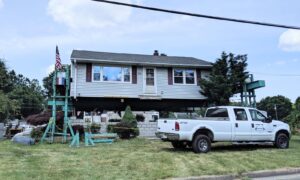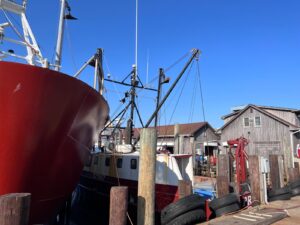Northeast U.S.
 Philadelphia and New Jersey
Philadelphia and New Jersey
In 2021, I was awarded a Coast and People grant from the National Science Foundation to research how local underserved and marginalized households make decisions about climate-related adaptation in the Northeast U.S. If you want to know more about this project and the larger grant, please visit coastalhub.org for more information!
The ultimate goal of the project is to provide experts, decision-makers, and other community leaders with key information regarding potential adaptation pathways to the deep uncertainty generated by climate change and urban development. This goal closely matches my interests in assessing which forms of institutional design will be effective in achieving sustainable governance of natural resources into the future. Moreover, it coincides with my interest in developing socioeconomic monitoring tools that can help assess how local communities are being affected by the synergy between anthropogenic and environmental changes as well as the identification of alternative strategies that may foster resilience at the household level.
Socio-economic Indicators
During my tenure at the National Oceanic and Atmospheric Administration (2014-2015), I was tasked with developing an assessment of the use of social and economic indicators to inform policy and decision-makers in ocean and coastal environments. I became the executive secretary of the Interagency Working group in Ocean Social Sciences (IOSSWG) in charge of the review process, allowing me to participate in multiple interagency meetings that resulted in the elaboration of a report submitted to the White House Office of Science and Technology in 2015. My work on these issues continued into early 2016 as I became Assistant research scientist at Texas A&M-Corpus Christi. In the following years, I participated in several research initiatives (one funded by the Texas Commission on Environmental Quality and the Texas Governor) to identify socioeconomic indicators for monitoring socioecological change. For example, I participated in the workshops leading to the development and pilot testing of an impact assessment framework similar to EBM-DPSER (Ecosystem Based Management – Driver, Pressure, State, Ecosystem service, and Response) for the Mission Aransas Reserve in Texas. I have continued working on the past few years in several indicator-related projects and have been a member of several working groups seeking to develop a suite of socio-economic indicators that can be used across multiple institutions. You can find more information and specific contributions in my publications page.
Coastal Fisheries and COVID
 To further explore how coastal communities and fisheries in the Northeast U.S. are responding to the compounded effects of climate change, anthropogenic development, and policies, in 2019 I received a NOAA award in conjunction with Dr. Olaf Jensen, Dr. Malin Pinsky, Dr. John Wiedemann, and Dr. Chris Free. Over the past year, we were able to carry out an online survey that assessed how commercial fishing households across ten states in the Northeast were coping with pressures associated to environmental, economic, and policy restrictions as well as the effect of the COVID pandemic on their livelihood. As part of the protocol, I was able to pilot test a modification of the survey I developed in my NASEM project measuring community resilience and potential long-term impacts of compounded effects. This work was complemented with extensive interviews with local fishermen in 2021, 2022, and 2023. Unfortunately, given the restrictions imposed to in-presence research, we were faced with the challenge of adapting interviews to remote protocols. Preliminary findings from this project have generated significant interest among management agencies and other colleagues. They have been published in PLOS one, in conjunction with a dataset of responses (Harvard Repository) (Smith et al. 2020). Once interviews are concluded, we are expecting to be able to integrate our results into a model of alternative fishing portfolios that will allow fishermen to identify how future climate change scenarios may affect their ability to operate.
To further explore how coastal communities and fisheries in the Northeast U.S. are responding to the compounded effects of climate change, anthropogenic development, and policies, in 2019 I received a NOAA award in conjunction with Dr. Olaf Jensen, Dr. Malin Pinsky, Dr. John Wiedemann, and Dr. Chris Free. Over the past year, we were able to carry out an online survey that assessed how commercial fishing households across ten states in the Northeast were coping with pressures associated to environmental, economic, and policy restrictions as well as the effect of the COVID pandemic on their livelihood. As part of the protocol, I was able to pilot test a modification of the survey I developed in my NASEM project measuring community resilience and potential long-term impacts of compounded effects. This work was complemented with extensive interviews with local fishermen in 2021, 2022, and 2023. Unfortunately, given the restrictions imposed to in-presence research, we were faced with the challenge of adapting interviews to remote protocols. Preliminary findings from this project have generated significant interest among management agencies and other colleagues. They have been published in PLOS one, in conjunction with a dataset of responses (Harvard Repository) (Smith et al. 2020). Once interviews are concluded, we are expecting to be able to integrate our results into a model of alternative fishing portfolios that will allow fishermen to identify how future climate change scenarios may affect their ability to operate.